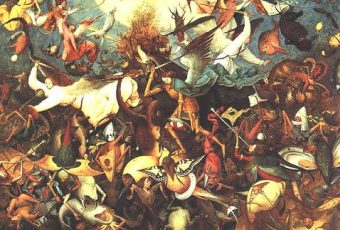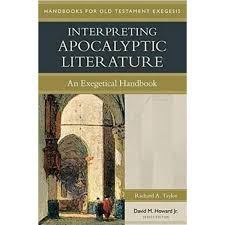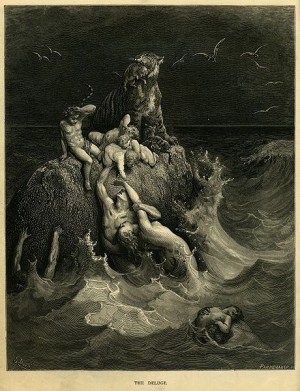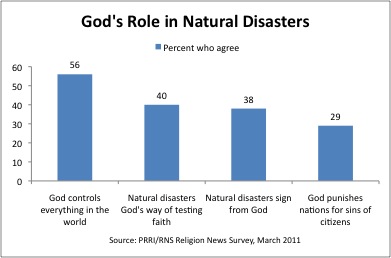 Have you ever tried to study or teach the books of Daniel and Revelation?
Have you ever tried to study or teach the books of Daniel and Revelation?
If so, you know how challenging they can be. This is partly because these books are two of the “Apocalyptic” books in the Bible. The apocalyptic books of the Bible are some of the hardest to read, study, understand, and teach.
I recently read an excellent book on how to study and teach these apocalyptic sections of the Bible. It is the book Interpreting Apocalyptic Literature by Richard Taylor.
In this book, Taylor provides an excellent summary of what Apocalyptic Literature is and why it is so difficult for modern readers to understand. He then moves on to provide numerous suggestions and guidelines for studying Apocalyptic Literature and teaching it to others (e.g., p 118f). Taylor also includes several warnings about the pitfalls that many ancient and modern Christians have fallen into when they study and teach these difficult portions of the Bible (p. 130f).
 I found this book to be one of the best introductory books I have read on Apocalyptic Literature in the Bible, and highly recommend it for anybody who wants to study, teach, or preach through any of the Apocalyptic books or sections of the Bible. This is especially true if you plan on teaching the book of Daniel. I say this because the Taylor uses the book of Daniel to provide practical examples of how to read and teach Apocalyptic Literature. As such, this book almost serves as a good mini commentary on Daniel.
I found this book to be one of the best introductory books I have read on Apocalyptic Literature in the Bible, and highly recommend it for anybody who wants to study, teach, or preach through any of the Apocalyptic books or sections of the Bible. This is especially true if you plan on teaching the book of Daniel. I say this because the Taylor uses the book of Daniel to provide practical examples of how to read and teach Apocalyptic Literature. As such, this book almost serves as a good mini commentary on Daniel.
Of course, if you are studying Revelation, this book by Taylor will be helpful too, but there are not nearly as many tips or suggestions on Revelation as there are on Daniel. This is probably the only downfall to Taylor’s book, since Revelation tends to be more difficult to read and understand than Daniel. But I have previously provided some tips on reading Revelation, and there is another book in the series which focuses specifically on Revelation.
So, do you want to study and teach Daniel and other apocalyptic books of the Bible? Interpreting Apocalyptic Literature by Richard Taylor will lead you in the right direction.







 Remember Andrea Yates? She is the mother who, in 2001,
Remember Andrea Yates? She is the mother who, in 2001,  On the one hand, we say, “There is no way God told these mothers to drown their babies,” but then we turn around and say, “God drowned millions of babies during the flood.”
On the one hand, we say, “There is no way God told these mothers to drown their babies,” but then we turn around and say, “God drowned millions of babies during the flood.” I have talked about this with numerous people over the past couple years, and almost without fail, people who defend the divine origin of the flood point to Jesus entering the temple with a whip (John 2:15; Matt 21:12) as proof that Jesus was also involved in sending the flood.
I have talked about this with numerous people over the past couple years, and almost without fail, people who defend the divine origin of the flood point to Jesus entering the temple with a whip (John 2:15; Matt 21:12) as proof that Jesus was also involved in sending the flood. If Jesus is a God who drowns babies because “They’re the devil!” and then rides His horse through a lake of blood from His slain enemies because “They wouldn’t worship me!” (Duh! You drowned millions of their babies!), I’m just not sure this sort of God is worthy of our worship.
If Jesus is a God who drowns babies because “They’re the devil!” and then rides His horse through a lake of blood from His slain enemies because “They wouldn’t worship me!” (Duh! You drowned millions of their babies!), I’m just not sure this sort of God is worthy of our worship.
 We are looking at 4 reasons the Bible is unique. Here is a brief summary of where we have been so far:
We are looking at 4 reasons the Bible is unique. Here is a brief summary of where we have been so far: When we are violent, we make God the scapegoat for our violence. We learned this practice from the father and mother of humanity, Adam and Eve. After they ate the forbidden fruit in the Garden of Eden, Adam blamed Eve, and Eve blamed the serpent, but both inferred blame upon God. In blaming Eve, Adam said “the woman whom You gave to be with me, she gave me of the tree, and I ate” (Gen 3:12). Adam implies that if God had not given the woman to him, Adam never would have sinned. It was God’s fault. Eve’s attempt to blame God is not so obvious, but in blaming the serpent, it seems that she implies that if the serpent had not been in God’s Garden (for didn’t God create all the animals?), or if God had given to Eve the same instructions He had given to Adam (for didn’t God only give His instructions about the forbidden fruit to Adam?) Eve would not have been deceived.
When we are violent, we make God the scapegoat for our violence. We learned this practice from the father and mother of humanity, Adam and Eve. After they ate the forbidden fruit in the Garden of Eden, Adam blamed Eve, and Eve blamed the serpent, but both inferred blame upon God. In blaming Eve, Adam said “the woman whom You gave to be with me, she gave me of the tree, and I ate” (Gen 3:12). Adam implies that if God had not given the woman to him, Adam never would have sinned. It was God’s fault. Eve’s attempt to blame God is not so obvious, but in blaming the serpent, it seems that she implies that if the serpent had not been in God’s Garden (for didn’t God create all the animals?), or if God had given to Eve the same instructions He had given to Adam (for didn’t God only give His instructions about the forbidden fruit to Adam?) Eve would not have been deceived.


 When most people ask this question, they are primarily referring to the “400 years of silence” in between Malachi and Matthew. I will try to explain what was going on during those years, but really, the question of God’s so-called “years of silence” is much more complex.
When most people ask this question, they are primarily referring to the “400 years of silence” in between Malachi and Matthew. I will try to explain what was going on during those years, but really, the question of God’s so-called “years of silence” is much more complex.
 But God’s apparent silence throughout most of history is not because God was absent or inactive, but simply because it takes eyes of faith to see where God is at work even when He doesn’t have someone write about it.
But God’s apparent silence throughout most of history is not because God was absent or inactive, but simply because it takes eyes of faith to see where God is at work even when He doesn’t have someone write about it.